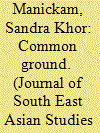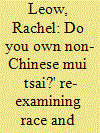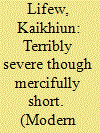|
|
|
Sort Order |
|
|
|
Items / Page
|
|
|
|
|
|
|
| Srl | Item |
| 1 |
ID:
090705


|
|
|
|
|
| Publication |
2009.
|
| Summary/Abstract |
This article explores the common bases of knowledge on race among Malay intellectuals and British scholar-officials in British Malaya. It focuses on genealogies of knowledge that not only lead back to Europe, but to contexts in the Malay Archipelago, encompassing both coloniser and colonised as agents of production of colonial knowledge on race. Race was a strategy adopted by Malay intellectuals in a colonial milieu, in line with histories and conditions before and during the period of British control over Malaya. The notion of complicities is explored in studying the interaction between British and Malay intellectuals which produced colonial knowledge on race.
|
|
|
|
|
|
|
|
|
|
|
|
|
|
|
|
| 2 |
ID:
115292


|
|
|
|
|
| Publication |
2012.
|
| Summary/Abstract |
This paper considers the abolition of the mui tsai (young female bondservants) as it unfolded in British Malaya, and challenges the overemphasis on Hong Kong as the primary focus of mui tsai scholarship. While the mui tsai system was defended as a time-honoured Chinese tradition, this paper uses new material to show that trans-racial considerations figured prominently in mui tsai abolition in Malaya, particularly in helping to recast it as a wider problem of child welfare. It is argued that this neglected aspect of mui tsai abolition only comes clearly to light in the Malayan case; for only in the intensely multi-racial conditions of peninsular Malaya could the question be asked: 'Do you own non-Chinese mui tsai?'
|
|
|
|
|
|
|
|
|
|
|
|
|
|
|
|
| 3 |
ID:
191687


|
|
|
|
|
| Summary/Abstract |
The cultural, technological, and socioeconomic dimensions of exotic animal introductions into the Malayan Peninsula have largely escaped the notice of scholars of British Malaya. At the same time, the scientific literature on exotic ichthyological introductions into Malaya has framed such introductions in largely biological terms. Biological factors alone, however, cannot explain the introduction and cultivation of exotic (sometimes temperate) fishes in tropical Malayan waters. Between 1923 and 1942, the Fisheries Department of the Straits Settlements and Federated Malay States experimented with introducing three categories of exotic fishes into the Malayan Peninsula. These fishes—the sepat siam, Chinese carp and English trout—were reared and released into demographic and geographical landscapes profoundly shaped by imperial power. These animals were thus ‘fishes of Empire’, their introduction and cultivation in the Malayan Peninsula significantly influenced by the scientific, socioeconomic, technological, and cultural contexts of the British Empire. Studying the places, peoples, and technologies that shaped (and were in turn shaped by) these fishes of Empire offers insights into the intersections of imperial power, colonial science, and environmental history.
|
|
|
|
|
|
|
|
|
|
|
|
|
|
|
|
| 4 |
ID:
146838


|
|
|
|
|
| Summary/Abstract |
This article explores ideas of belonging that gained prominence among Indian Tamils in interwar British Malaya by revisiting a transnational dialogue that has been under-represented in the community's history. Through an analysis of the developments that unfolded during and in the decade following Periyar E. V. Ramasamy's first visit to Malaya in 1929, it positions the diaspora within the politics of a reform movement that had a profound impact on Tamil cultural and political consciousness in two colonial societies. Having originated in the former Madras Presidency, the Self-Respect movement entered Malaya at a time when both societies were engulfed in momentous change. Led by the middle class, the movement's subsequent ‘Malayanization’ raised salient questions of political allegiance as it was adapted, challenged, and ultimately reapplied to India in the interest of defending the Tamil homeland. Through an analysis of the contentious loyalties that Malayan Self-Respecters encouraged, and the responses that surfaced in the process, this article will demonstrate that the movement opened up critical new discursive spaces through which the diaspora engaged with its ‘home’ and ‘host’ societies.
|
|
|
|
|
|
|
|
|
|
|
|
|
|
|
|
| 5 |
ID:
077309


|
|
|
|
|
| Publication |
2007.
|
| Summary/Abstract |
The influenza epidemic swept through our midst in September and October, unhappily with fatal consequences to a number of friends in the Tamil community. We are glad to say that though terribly severe while it lasted, its duration was mercifully short. On the other hand, the great news that the armistice has been signed filled us with unaccustomed joy
|
|
|
|
|
|
|
|
|
|
|
|
|
|
|
|
|
|
|
|
|